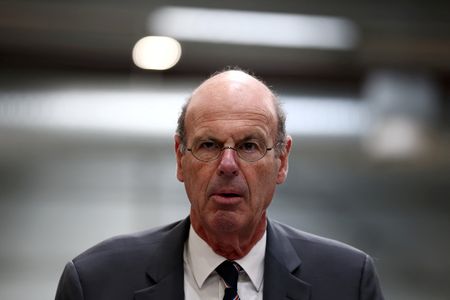By Yuka Obayashi
TOKYO (Reuters) -Japanese oil companies are scaling back decarbonisation initiatives, including hydrogen and ammonia projects, amid a global shift towards more stable and cost-effective fossil fuels.
The move reflects mounting concerns over energy security, U.S. policy risks, and rising material costs driven by inflation, all of which undermine project profitability and predictability.
Across the global energy sector, companies that had reoriented their portfolios to address climate change are increasingly refocusing on oil and gas, where returns have become more attractive following a rebound in fossil fuel prices from pandemic-era lows.
“The trend toward a carbon-neutral society is slowing, and the full-scale bifurcation of the energy transition, previously expected around 2030, may be delayed,” Eneos Holdings CEO Tomohide Miyata told a news conference this week.
Japan’s largest refiner is in no rush to supply hydrogen and ammonia, as surging costs are clouding the likelihood of capital investment, Miyata added.
In its new three-year business strategy through March 2028, Eneos removed its previous target of supplying up to 4 million metric tons of hydrogen by fiscal year 2040.
Instead, stable and affordable energy, including oil, has become more important amid the rising cost of decarbonisation technologies, Miyata said, adding the company would ramp up investment in liquefied natural gas.
Idemitsu Kosan, Japan’s No.2 refiner, has trimmed decarbonisation investment plans, cutting its budget for initiatives such as hydrogen, ammonia, and synthetic fuels from 1 trillion yen ($6.9 billion) to around 800 billion yen for the period from fiscal 2023 to 2030, President Noriaki Sakai said this week.
“We sense that the momentum toward decarbonisation is slowing somewhat … and believe it is necessary to adopt a flexible approach regarding both the pathway and timeline to achieving a carbon-neutral society by 2050,” he said.
While the global slowdown in low-carbon solutions has become increasingly evident, these remarks are among the most explicit to date from Japanese oil executives to acknowledge it.
In February, BP revamped its strategy to cut spending on renewables and lower-carbon solutions while increasing annual oil and gas spending. Norway’s Equinor scrapped its 2030 target for investments in renewables and low-carbon solutions.
At the energy sector’s annual conference in Houston in March, executives from both fossil fuel and renewable companies touted the need to shift from “energy transition” to “energy additions”.
($1 = 145.7600 yen)
(Reporting by Yuka ObayashiEditing by Mark Potter)








